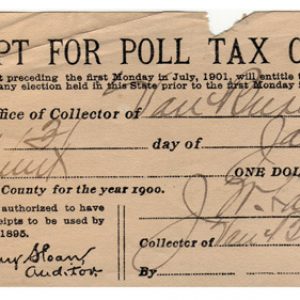calsfoundation@cals.org
Election Law of 1891
The passage of the Election Law of 1891 was essential to the solidification of power in the state for Democrats during the post-Reconstruction era and was the first step in making Arkansas a one-party state. In conjunction with the subsequent Poll Tax Amendment, controversially passed during the 1892 general election, the Election Law of 1891 effectively disfranchised African Americans in Arkansas and legally suppressed Republican and third-party political opposition.
By 1888, Democratic Party officials in Arkansas were expressing concern about perceived election fraud in the state and the threat of federal oversight of state elections. Evidence of widespread election fraud and the highly publicized murder of Republican candidate John M. Clayton brought about mounting calls for election reform legislation. After much contentious debate on two election reform bills during the 1891 legislative session, House Bill No. 162 was introduced, which, after some minor revisions, quickly become the Election Law of 1891. The bill carried easily in the House and the Senate mostly along party lines, with most Democrats voting for the reform bill while Republicans and Union Laborites, who were allied with a few Democrats from western Arkansas, voted against it.
The Election Law of 1891 did three fundamental things. It created standard state ballots, centralized control of the voting process, and enacted the secret ballot system (also known as the Australian ballot system). The centralized control over the voting process was achieved by the law’s creation of a state election board made up of the governor, the state auditor, and the secretary of state. The members of this board would appoint three judges for every voting precinct, and the precinct judges could select two clerks to assist them at the polls. This mechanism effectively took the control of state elections out of the hands of county officials and consolidated power into the hands of Democratic Party leaders.
The secret ballot system and the standardized ballot made the Election Law of 1891 a subtle literacy test for voters. The standardized state ballot ended the party tickets and county ballots that had previously been used to make it easy for even an illiterate electorate to vote the party line by means of designated shapes or symbols on a ballot. In conjunction with the standard ballot, the secret ballot system mandated that no one other than the precinct judges could assist voters in marking their ballot. Under the law, an illiterate man who needed help to vote was required to apply to two of the precinct judges, who would then have to order all other voters to vacate the polling place before the two judges could prepare the ballot for the voter. Of course, this process naturally discouraged most illiterate men from even going to the polls.
The 1900 Census data indicates that there were 36,194 white illiterate males, while the number of black male illiterates was 54,015. The white population was significantly larger than the black population in Arkansas in the late nineteenth century; thus, proportionately, the potential number of black voters was significantly diminished compared to the decrease in white voters. For example, the number of white male potential voters who considered themselves literate in 1890 was 195,324. The number of black male potential voters who considered themselves literate in 1890 was 48,072.
The total vote tally in the gubernatorial race in 1890 was 191,448. In 1892’s election, the first after the Election Law of 1891 was enacted, the vote total was 156,186, which meant that 35,262 fewer votes were cast after the law took effect. The estimated black vote dropped from seventy-one percent of eligible voters in the 1890 election to thirty-eight percent in the 1892 election, while the white vote dropped only from seventy-five percent in 1890 to sixty-seven percent in 1892. In the 1891 Arkansas General Assembly, there were eleven black representatives.
In 1893, after the law was in place, there were four in the House and only one in the Senate, all elected from majority black counties. By 1895, however, there were no African Americans in the Arkansas General Assembly.
There are four interpretations to explain why the election law was enacted in 1891: to quell the growing momentum of the agrarian third-party and Republican fusion movement, to eliminate the black vote (particularly in local contests in eastern Arkansas), to centralize political control of the state into the hands of a few elite Democrats, and to remove the need for federal election oversight (reform). Various historians of the Southern disfranchisement have tended to stress one of these explanations over the others depending on the historian’s particular ideology. Recent research of the Election Law of 1891 points to all four of the explanations working in different regions of Arkansas independently, based largely on population demographics and local political concerns in various sections of the state.
For additional information:
Barnes, Kenneth C. Who Killed John Clayton? Political Violence and the Emergence of the New South, 1861–1893. Durham, NC: Duke University Press, 1998.
Branam, Chris M. “Another Look at Disfranchisement in Arkansas, 1888–1894.” Arkansas Historical Quarterly 69 (Autumn 2010): 245–262.
Graves, John William. Town and Country: Race Relations in an Urban-Rural Context, Arkansas 1865–1905. Fayetteville: University of Arkansas Press, 1990.
Kousser, J. Morgan. The Shaping of Southern Politics: Suffrage Restriction and the Establishment of the One-Party South, 1880–1910. New Haven: Yale University Press, 1974.
Ogden, Frederic D. The Poll Tax in the South. Tuscaloosa: University of Alabama Press, 1958.
Perman, Michael. Struggle for Mastery: Disfranchisement in the South, 1888–1908. Chapel Hill: University of North Carolina Press, 2001.
Woodward, C. Vann. Origins of the New South, 1877–1913. Baton Rouge: Louisiana State University Press, 1951.
Chris M. Branam
Fayetteville, Arkansas







Comments
No comments on this entry yet.